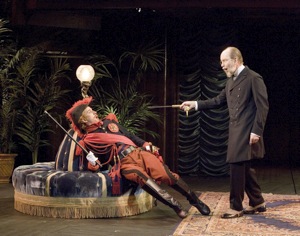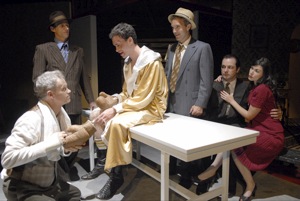-
- Michelle Obama: Barack will fight for gay and lesbian equality
- Virginia says groom and ‘bride’ deceived local officials
- Church calls for members to support ballot measure
- New meaning for San Francisco Pride parade
- Senate reaches an agreement on global AIDS bill
- Archdiocese intervenes in church’s Pride service
- National News Briefs
- World News Briefs
Theater
The anatomy of obsession, the drive for fame
Published Thursday, 03-Jul-2008 in issue 1071
The Bard, who told us “the course of true love never did run smooth,” shows us in All’s Well That Ends Well the depths a woman can be driven to by obsession.
The Shakespearean piece plays through Sept. 17 in repertory with Romeo and Juliet and The Merry Wives of Windsor at this summer’s Shakespeare festival on the Lowell Davies Festival Stage. Festival artistic director Darko Tresnjak directs All’s Well.
All’s Well is considered one of the Bard’s “problem” plays because it falls into the cracks between comedy and tragedy. Whereas the other two plays this summer represent the comic and tragic aspects of love, All’s Well is bittersweet at best and much more troubling in its assertions about what a woman is willing to do to marry the man of her choice, and what a man is willing to do to escape.
Probably inspired by the story of Giletta of Narbonne in Boccaccio’s Decameron, All’s Well gives us Helena (Kimberly Parker Green), daughter of a recently deceased physician and now ward of the Countess of Rossillion (Kandis Chappell), who falls hopelessly and one-sidedly in love with the Countess’ son Bertram (Graham Hamilton). Bertram not only rebuffs her but is downright cruel.
But her obsession is such that she will not take no for an answer. She follows Bertram to the French court, where she devises a plan to use her father’s remedies to cure the king of a possibly fatal ailment, bargaining with him: if she fails, she forfeits her life; if she succeeds, she wants the right to name her husband.
The king recovers. Aghast at the shotgun marriage that is his lot, Bertram plans to leave immediately with buddy Parolles (Bruce Turk) for the war in Florence. He sends a message to Helena that he will never marry her until she wears a ring he now has on his finger and carries his child, stating that neither will ever come to pass. He also sends a note to his mother stating he will never belong to a wife forced upon him.
But even that doesn’t stop her, and while feminists in the audience will be screaming “Good riddance,” Helena charges ahead with an even sillier plan (though, on reflection, perhaps no sillier than some the ladies of “Sex in the City” are capable of).
Though this plot, being neither fish nor fowl and proposing a dim view of the ethics of both genders, may be a bit of a hard sell for a summer evening, Tresnjak has mounted a handsome production. The versatile set – all dark wood, stairs and doors – will be used for all three productions; in this case, Linda Cho’s beautiful Edwardian-inspired costumes and rich looking teal curtains and upholstery add to the opulent look.
Shakespeare is seldom without a fool, even in “serious” works. All’s Well boasts two: Bertram’s buddy, the garrulous opportunist Parolles, given a wonderfully comic reading by Bruce Turk and terrific costumes by Cho; and Lavatch, the roly-poly servant of the countess, played with great comic timing by Eric Hoffmann.
Chappell’s solid performance as the Countess anchors this production with a humanity to counterbalance the bad behavior of the young couple. Hamilton has the unenviable job of playing a cad, and does it well; Green the even more thankless one of playing the aggrieved party who lacks the brains to stop before she makes things worse.
Vivia Font is convincing as Diana, part of Helena’s second plot to ensnare Bertram. Celeste Ciulla is also excellent as Diana’s mother.
The trio of plays in this year’s Shakespeare festival has a theme, says Festival artistic director Darko Tresnjak. “They are plays about desire. Tragic and triumphant in Romeo and Juliet, comic in The Merry Wives of Windsor, and bittersweet in All’s Well That Ends Well.”
All’s Well That Ends Well plays in rotation with Romeo and Juliet and The Merry Wives of Windsor through Sept. 28 at the Lowell Davies Festival Stage. For tickets all 619-233-5623 or visit www.theoldglobe.org.
A talented violinist decides to make a Faustian bargain in Clifford Odets’ 1937 classic Golden Boy, in a dazzling production through July 13 at New Village Arts Theatre. Joshua Everett Johnson directs.
Joe Bonaparte (Michael Zlotnik), son of a gentle Italian immigrant fruit peddler, grew up in New York, picked on for his small size, laughed at for his funny name and ridiculed for his love of playing the violin. Though he loves music, he craves respect and, let’s admit it, revenge.
For the past few years, unbeknownst to his father, Joe has been working out in a gym and has discovered a talent for boxing. Now he presents himself to fight promoter Tom Moody (Manny Fernandes) as a replacement for Moody’s scheduled lightweight, who has broken a hand sparring.
Joe’s need for recognition and Moody’s desperation combine to give Joe his pugilistic break. To Moody’s surprise, the kid wins, and Moody and trainer Tokio (Jeff Anthony Miller) take on the nurture and marketing of the promising new golden boy.
Success brings attention: Eddie Fuseli, gambler and gunman, played to scene-stealing, scenery-chewing perfection by Joshua Everett Johnson, wants to buy a piece of him. Even Moody’s girlfriend Lorna (Amanda Sitton) shows interest, and a bit more.
He begins to acquire the trappings of success: a fast new car, which he drives recklessly; fancy clothes; a press corps following. Soon he will be forced to choose between the muse and the ring, art and commerce, his father’s wishes and the anger he feels the need to work out.
Golden Boy has a terrific cast, anchored by several outstanding performances. Fernandes is terrific as the fast-talking, cigar-chomping Moody, who sees Joe as his ticket to financial stability.
Sitton is heartbreaking as the conflicted Lorna, tired of playing second string to Moody’s wife, who gets what may be one last chance to grab happiness.
Poppick impresses as the quietly dignified Mr. Bonaparte, saddened by his son’s choices.
Zlotnik’s Joe, the musician with the mighty fists, convinces in his transition from obscure musician to press darling.
Golden Boy can be seen as allegory, cautionary tale or family saga, but at heart it’s a tale about the decision to sell out for success. Odets himself could relate to the struggle between art and commerce in the play: he periodically went off to write in more lucrative but less satisfying Hollywood pastures.
This play has everything, including a large cast, several locations and three acts, a combination that makes it difficult to produce. New Village Arts is up to the challenge. Don’t miss this Golden Boy, one of the year’s best productions.
Golden Boy plays through July 13 at New Village Arts Theatre. Shows Thursday through Saturday at 8 p.m.; matinees Saturday at 3 and Sunday at 2 p.m. For tickets call 760-433-3245 or visit www.newvillagearts.org.
|
|
Copyright © 2003-2025 Uptown Publications



